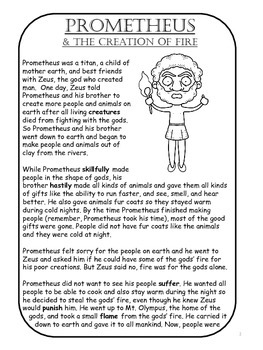
Words:901-1000
Skills:Context CluesSummaryTheme
Prometheus, in Greek religion, one of the Titans, the supreme trickster, and a god of fire. His intellectual side was emphasized by the apparent meaning of his name, Forethinker. In common belief he developed into a master craftsman, and in this connection he was associated with fire and the creation of mortals. The fifth century BCE (499-400 BCE), during which time Aeschylus lived and wrote, is known as the Golden Age of the Classical Period. Some of the most important works of poetry, drama, and philosophy came out of the Golden Age, including the only three tragedians whose work has survived antiquity—Aeschylus, Sophocles, and Euripides.
Grades:3rd4th5th6th
Topics:Folklore, Myths, and Legends
- Prometheus Bound was apparently the first play in a trilogy (the other two plays, now lost except for some fragments, were Prometheus Unbound and Prometheus the Fire-Bringer). Although a number of modern scholars have questioned whether Aeschylus was truly the author of the play, it has always been included among his works.
- The Myth of Prometheus, the Fire-Giver The story of Prometheus, the Fire-Giver is featured in the book entitled Greek Gods, Heroes and Men by Caroline H. Harding and Samuel B. Harding, published in 1906 by Scott, Foresman and Company.
Prometheus Moral Of The Story

Genres:Prose
Lexile Range: —
Lexile Measure: —
Prometheus Story Pdf Full
CCSS:Reading: Literature
Themes: —
Chapter 3 passage: In Greek mythology, Prometheus is credited with giving fire to man. This story was originally published in 1895. After reading the passage, students will answer questions on the language, the details and the theme.

The Story of Prometheus: How Fire Was Given to Men
by James Baldwin from Old Greek Stories

----------------------------------
In those old, old times, there lived two brothers who were not like other men, nor yet like those Mighty Ones who lived upon the mountain top. They were the sons of one of those Titans who had fought against Jupiter and been sent in chains to the strong prison-house of the Lower World.
The name of the elder of these brothers was Prometheus, or Forethought; for he was always thinking of the future and making things ready for what might happen to-morrow, or next week, or next year, or it may be in a hundred years to come. The younger was called Epimetheus, or Afterthought; for he was always so busy thinking of yesterday, or last year, or a hundred years ago, that he had no care at all for what might come to pass after a while.
For some cause Jupiter had not sent these brothers to prison with the rest of the Titans.
Prometheus did not care to live amid the clouds on the mountain top. He was too busy for that. While the Mighty Folk were spending their time in idleness, drinking nectar and eating ambrosia, he was intent upon plans for making the world wiser and better than it had ever been before.
He went out amongst men to live with them and help them; for his heart was filled with sadness when he found that they were no longer happy as they had been during the golden days when Saturn was king. Ah, how very poor and wretched they were! He found them living in caves and in holes of the earth, shivering with the cold because there was no fire, dying of starvation, hunted by wild beasts and by one another -- the most miserable of all living creatures.
'If they only had fire,' said Prometheus to himself, 'they could at least warm themselves and cook their food; and after a while they could learn to make tools and build themselves houses. Without fire, they are worse off than the beasts.'
Then he went boldly to Jupiter and begged him to give fire to men, that so they might have a little comfort through the long, dreary months of winter.
'Not a spark will I give,' said Jupiter. 'No, indeed! Why, if men had fire they might become strong and wise like ourselves, and after a while they would drive us out of our kingdom. Let them shiver with cold, and let them live like the beasts. It is best for them to be poor and ignorant, that so we Mighty Ones may thrive and be happy.'
Prometheus made no answer; but he had set his heart on helping mankind, and he did not give up. He turned away, and left Jupiter and his mighty company forever.
As he was walking by the shore of the sea he found a reed, or, as some say, a tall stalk of fennel, growing; and when he had broken it off he saw that its hollow center was filled with a dry, soft pith which would burn slowly and keep on fire a long time. He took the long stalk in his hands, and started with it towards the dwelling of the sun in the far east.
'Mankind shall have fire in spite of the tyrant who sits on the mountain top,' he said.
He reached the place of the sun in the early morning just as the glowing, golden orb was rising from the earth and beginning his daily journey through the sky. He touched the end of the long reed to the flames, and the dry pith caught on fire and burned slowly. Then he turned and hastened back to his own land, carrying with him the precious spark hidden in the hollow center of the plant.
He called some of the shivering men from their caves and built a fire for them, and showed them how to warm themselves by it and how to build other fires from the coals. Soon there was a cheerful blaze in every rude home in the land, and men and women gathered round it and were warm and happy, and thankful to Prometheus for the wonderful gift which he had brought to them from the sun.
It was not long until they learned to cook their food and so to eat like men instead of like beasts. They began at once to leave off their wild and savage habits; and instead of lurking in the dark places of the world, they came out into the open air and the bright sunlight, and were glad because life had been given to them.
After that, Prometheus taught them, little by little, a thousand things. He showed them how to build houses of wood and stone, and how to tame sheep and cattle and make them useful, and how to plow and sow and reap, and how to protect themselves from the storms of winter and the beasts of the woods. Then he showed them how to dig in the earth for copper and iron, and how to melt the ore, and how to hammer it into shape and fashion from it the tools and weapons which they needed in peace and war; and when he saw how happy the world was becoming he cried out:
'A new Golden Age shall come, brighter and better by far than the old!'
1. Prometheus means 'forethought.' Why does Prometheus' name seem right for him?
2. What does wretched mean here: 'Ah, how very poor and wretched they were'?
3. What was one other thing Prometheus taught men?
4. Do you think Prometheus was right to disobey Jupiter and give fire to men? Why or why not?